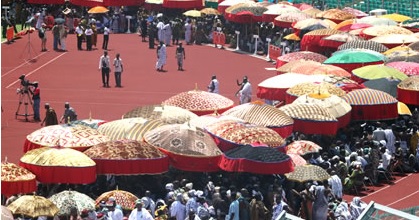Constitutionalise chieftaincy in Ghana
 Who is the chief of the land? In answer to this simple question, swords, cutlasses, machetes, guns and hunger for blood begin to sound to show their popularity.
Who is the chief of the land? In answer to this simple question, swords, cutlasses, machetes, guns and hunger for blood begin to sound to show their popularity.
Advertisement
Chieftaincy disputes have bedevilled our nation with loss of lives and properties for far too long. A lasting solution is needed.
Towards a peaceful nation
The major cause of this problem is that for the most part, there are no written records of how chiefs will be nominated and installed. In this 21st Century, almost all tribes in Ghana still rely on oral tradition to determine who should be the king. This can easily be resolved by constitutionalising the chieftaincy system in Ghana.
Any culture that does not go through evolutionary discipline dies and so will all of our cultural and traditional systems in Ghana if we do not allow them to grow. To leave a heritage for our people, we must start now with the documentation of our cultural and traditional practices and more importantly, explain the rationale behind them in contemporary language.
In most tribes, chieftaincy rotates among specific clans whose forefathers are said to have founded the state. The question always is, which clan must the next king come from? With marriages and inter-marriages across cultures and tribes, this is hard to determine. This is because whoever is elected may have blood from some other tribe or culture and where a pure blooded person of the tribe is required, conflict then arises as to his legitimacy.
Then there is the problem of whether the nominated chief or king is from a paternal or maternal inheritance tribe. Many Akan tribes are matrimonial while those of the other tribes, like the Gas and the Ewes, are patrimonial and this engenders arguments of legitimacy of the elected chief or king makers.
Kings stay on for a lifetime, a situation that also needs to be addressed. It has its merits and demerits. If the king lives for long on the throne, the tendency to forget whose turn it is to mount the throne is high. This opens the doors for many claimants, all fetching their facts from oral history; and everyone’s history comes from a different source.
The above situations are worsened by political influences of governments in power who may want specific candidates to become the chief of a tribe to the benefit of their party.
Towards Solution
I am neither a lawyer nor a constitutional expert but I believe that constitutionalising the chieftaincy system will not cost arms and legs. The goal of every tribe or clan is to enlighten and promote the welfare of its people. It should be easy to set up rules and guidelines as to who qualifies to be a chief. These will include their education, morality and technical know-how to lead the people. These requirements can be set up by every tribe.
To keep tradition, chiefs may still be nominated from the identified houses or clans. Clans can be required to present up to three candidates with their requisite qualifications and manifestoes detailing their vision and programmes for the electorate to vet and vote on. Vetted and found qualified, he is nominated for the position of a king and the traditional rituals are performed for his enthronement. Women can also be considered in this race as chiefs as it has happened before in some tribal states.
If a clan fails to present a qualified person for the throne, it loses its turn and will have to wait until the rotation gets to its turn in future. This will inspire clans and families to raise noble citizens.
To avert dictatorial tendencies, the duration of chieftaincy can be determined by every tribe. A possible duration could be for 25 years. A reasonable period on the throne will give hope to an otherwise aggrieved clan that it will soon be their turn and will dissuade tensions.
I am proposing that all tribes caught in chieftaincy disputes, halt and come together to restart a constitutional programme that will support them and their future generations. The conflicts must come to an end.
You cannot talk about chieftaincy issues without the subject of land ownership. Which portion of land belongs to which chief is also left to oral history and these cases take eternity to resolve in our courts. With your registered documents, you may spend more than four years in court with a trespasser who presents no documents. Magnify this to a whole chieftaincy dispute over land. The government and the judiciary must sit up. Ghanaians are peaceful people and this must not be taken for granted.
Swift resolution of land cases in our courts is the way forward. Meanwhile, it makes sense for chiefs to concede a few acres of land to the other chief or compromise to share the disputed portion of land than waste years in court. The value of a land is not in its size but in its effective management. With prudent land management, a chief with a vision will have more value for his land than those who just sell their unmanaged lands.
By Ishmael Tetteh/Ghana
The writer is with the Etherean Mission Int.
Email: [email protected]



